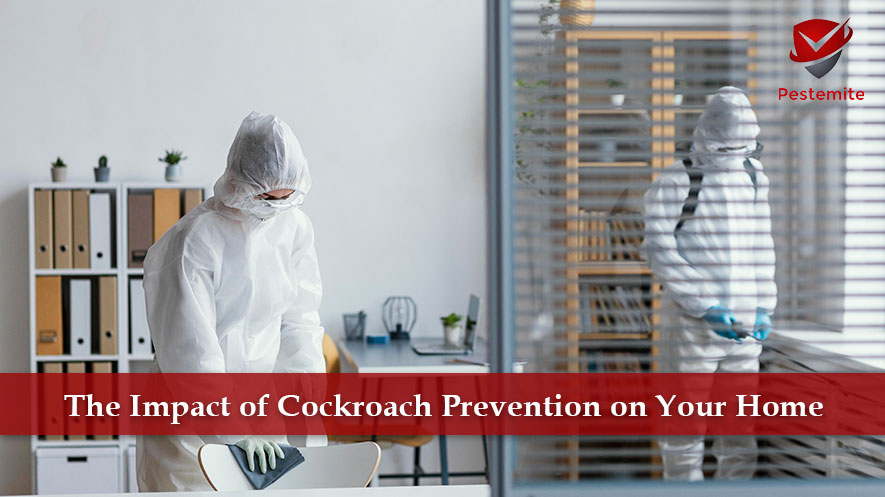The Impact of Cockroach Prevention on Your Home

Cockroaches leave behind droppings, oothecae (sheaths that contain eggs), and body parts, all of which can trigger asthma attacks. Landlords and homeowners need to take preventive measures, including regular cleaning and maintenance, to remove food, water, and shelter.
Moisture is also an attractant to Cockroach Prevention, so wipe down counters and tables after every meal and fix leaky faucets.
1. Health Issues
Cockroaches pick up germs on their spines as they crawl through sewage, garbage, decaying matter, and other filth. They then transfer these germs to food or utensils. They also shed their body parts, saliva and feces, all of which can contaminate surfaces. If an unknowing person ingests these contaminants, they can become very sick.
In addition to making asthma worse, cockroaches can spread 33 kinds of bacteria, six types of parasitic worms and seven kinds of human pathogens. This can cause many different diseases including diarrhea, vomiting and severe stomach cramps.
Most cockroach diseases are caused when uncooked or improperly cooked foods are consumed. They can also be transmitted when an individual touches something contaminated by a cockroach’s vomit, excrement or saliva and then places their hand into the mouth or eyes.
The most important step in cockroach prevention is to keep the living space clean. Regular vacuuming, sweeping and mopping will remove the food sources and other materials that attract cockroaches. This will also prevent the pests from transferring germs to sensitive surfaces. Eliminate cockroach hiding places by removing piles of paper, rags and boxes. Also, repair leaky pipes and fix cracks where cockroaches can get inside. Finally, put out a cockroach-proof trash can and clean it regularly. Also, wipe down kitchen counters and tables after each meal or snack.
2. Illnesses
Cockroaches are known to spread illnesses like dysentery, typhoid fever and salmonella poisoning. They get these bacteria from their filthy environments where they live and eat. Their legs have touch-sensitive spines and a large surface area where they can pick up pathogens that then become attached to whatever they brush against or ingest. Cockroaches can also contaminate food and surfaces in your home by shedding saliva, excrement, regurgitated cockroach body parts and shed allergens.
When humans inhale these substances they can cause asthma and allergies. They can also trigger respiratory infections. Cockroaches can even cause skin problems when people directly touch their legs which have sharp spines that may abrade the skin.
Some of the proteins in cockroach saliva, excrement and shed body parts can trigger asthma and allergic reactions in sensitive individuals. These proteins can also spread through the air via cockroach dust and may be picked up by people who are moving about their home.
To minimize these health risks, cockroaches should be eliminated in homes and businesses. In residential settings, keep kitchen and food storage areas clean to deter pests. This includes sweeping and mopping floors frequently and keeping counters, sinks and dishes clean. Store foods in sealed containers and avoid leaving food out on the counter or table. In condos and apartments, seal gaps in floorboards, walls, and cabinets where cockroaches might enter.
3. Allergies
Cockroach allergens (feces, saliva, body parts, droppings) can trigger asthma in people who are sensitive to cockroaches. Symptoms of cockroach allergy may include wheezing, coughing, skin rash or hives. These symptoms are triggered by the release of histamine, which is the body’s natural way to defend itself from foreign substances.
Allergies caused by cockroaches can lead to sleepless nights and unscheduled medical visits or school absences. Children can be particularly affected because they tend to spend more time indoors and are more susceptible to allergic reactions.
To avoid allergies, it is important to keep the house clean and free of clutter. Wipe down counters frequently and dust regularly. Store dry foods in sealed containers and use trash cans that are tightly closed to avoid attracting cockroaches. Make sure leaks are fixed right away to prevent cockroaches from getting access to water. Also, make sure to feed pets on a schedule and regularly clean their dishes so that there is no food residue that can attract cockroaches.
If you suspect that you have a cockroach allergy, talk to your doctor. They can perform a skin test or blood test to determine how your body reacts to cockroach allergens. Medications such as antihistamines can reduce the severity of allergy symptoms. Alternatively, immunotherapy can help you become desensitised to allergens over time.
4. Stress
Cockroach droppings, shed skin, and decaying bodies can release particles into the air that can aggravate asthma. These particles can also irritate skin and trigger other allergies. They may even contaminate food and cause other gastrointestinal problems.
Cockroaches are highly adaptable pestemite that can thrive in almost any environment. Taking steps to remove their food, water and shelter, as well as blocking their entry points into homes will greatly reduce the risk of infestation.
However, cockroaches can still slip into our homes through cracks and crevices, and other entry points. In addition, they can hitch a ride on items people bring into their homes such as bags, boxes or rolled-up papers.
To prevent cockroach invasions, it’s important to keep garbage and other waste in sealed containers. Trimming shrubbery and eliminating dense ground covers such as ivy, brush or tall grasses near buildings can reduce outdoor hiding places for roaches. In addition, removing stacks of firewood or lumber and storing all trash in bug-proof containers can help prevent outdoor cockroaches from coming indoors.
In addition, cleaning counters, tables, and stovetops after all meals, snacks, and food preparation can help limit the availability of cockroaches’ favorite foods. Keeping sinks, faucets and bathtubs clean of leaks and debris can also reduce the moisture that cockroaches require for survival.









